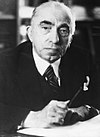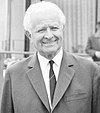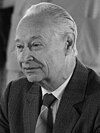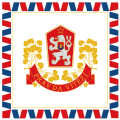The president of Czechoslovakia (Czech : prezident Československa , Slovak : prezident Česko-Slovenska ) was the head of state of Czechoslovakia , from the creation of the First Czechoslovak Republic in 1918 until the dissolution of the Czech and Slovak Federative Republic on 1 January 1993.
In periods when the presidency was vacant, most presidential duties were assumed by the prime minister .
The second section lists the leaders of the Communist Party of Czechoslovakia (KSČ) from 1948 to 1989. The post was titled as chairman from 1948 to 1953, first secretary from 1953 to 1971, and general secretary from 1971 to 1989. After the 1948 coup d'état , the KSČ's leader was the country's de facto chief executive. However, three party leaders (Klement Gottwald , Antonín Novotný and Gustáv Husák ) also served as president at some point in their tenures.
Political parties Other factions
No.
Portrait
Name(Birth–Death)
Ethnicity
Elected
Term of office
Political party
Took office
Left office
Time in office
(1918–1938)
1
Tomáš Masaryk (1850–1937)
Czech
1918 1920 1927 1934
14 November 1918
14 December 1935
17 years, 30 days
Independent
2
Edvard Beneš (1884–1948)
Czech
1935
18 December 1935
5 October 1938
2 years, 291 days
ČSNS
(1938–1939)
3
Emil Hácha (1872–1945)
Czech
1938
30 November 1938
15 March 1939
105 days
Independent
(1939–1945)Emil Hácha Protectorate of Bohemia and Moravia de jure autonomous region incorporated into Nazi Germany .[ 1] [ 2] Edvard Beneš Czechoslovak government-in-exile Allies during World War II .Jozef Tiso Nazi and clero-fascist Slovak Republic Avgustyn Voloshyn Carpatho-Ukraine invasion and occupation by the Kingdom of Hungary .
(1945–1948)
2
Edvard Beneš (1884–1948)
Czech
1946
4 April 1945
7 June 1948
3 years, 64 days
ČSNS
(1948–1989)Czechoslovak Socialist Republic (1960–1989)
4
Klement Gottwald (1896–1953)
Czech
1948
14 June 1948
14 March 1953
4 years, 273 days
KSČ
5
Antonín Zápotocký (1884–1957)
Czech
1953
21 March 1953
13 November 1957
4 years, 237 days
KSČ
6
Antonín Novotný (1904–1975)
Czech
1957 1964
19 November 1957
22 March 1968
10 years, 124 days
KSČ
7
Ludvík Svoboda (1895–1979)
Czech
1968 1973
30 March 1968
29 May 1975
7 years, 60 days
KSČ
8
Gustáv Husák (1913–1991)
Slovak
1975 1980 1985
29 May 1975
10 December 1989
14 years, 195 days
KSČ
(1989–1992)Czech and Slovak Federative Republic (1990–1992)
9
Václav Havel (1936–2011)
Czech
1989 1990 1992 (failed )
29 December 1989
20 July 1992
2 years, 204 days
OF
Except for the final office-holder, the leader of the KSČ was de facto
Title: Chairman (1948–1953) and first secretary (1953–1971).
No.
Portrait
Name(Birth–Death)
Ethnicity
Term of office
Took office
Left office
Time in office
1
Klement Gottwald (1896–1953)
Czech
February 1948
14 March 1953
5 years, 41 days
2
Antonín Novotný (1904–1975)
Czech
14 March 1953
5 January 1968
14 years, 297 days
3
Alexander Dubček (1921–1992)
Slovak
5 January 1968
17 April 1969
1 year, 102 days
4
Gustáv Husák (1913–1991)
Slovak
17 April 1969
17 December 1987
18 years, 244 days
5
Miloš Jakeš (1922–2020)
Czech
17 December 1987
24 November 1989
1 year, 342 days
6
Karel Urbánek (born 1941)
Czech
24 November 1989
20 December 1989
26 days
Timeline
Presidential standards
1918–1939, 1945–1960
1960–1990
1990–1992
See also
References
Heads of state and government of Europe
Heads
UN members Partially recognised2 Unrecognised states3
Heads of
UN members Partially recognised2 Unrecognised states3
1. Partially or entirely in Asia, depending on geographical definition.
2. Recognised by at least one United Nations member.
3. Not recognised by any United Nations members.



















